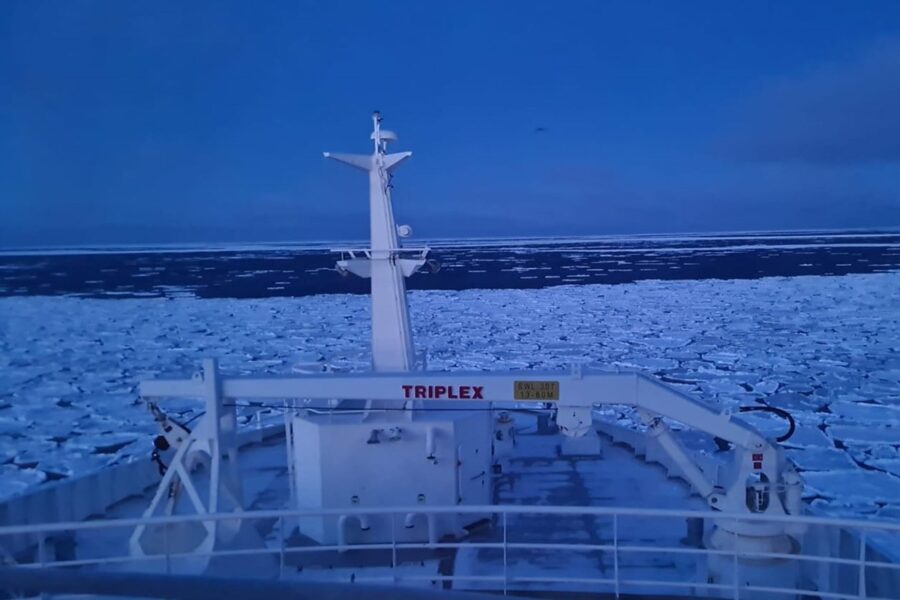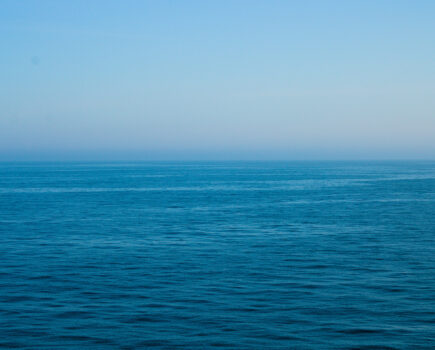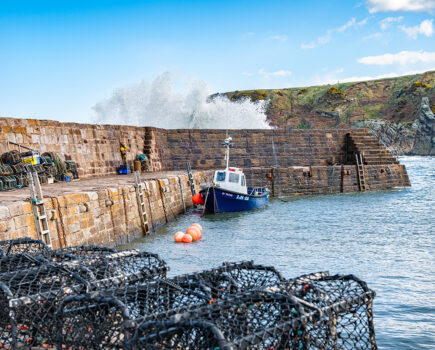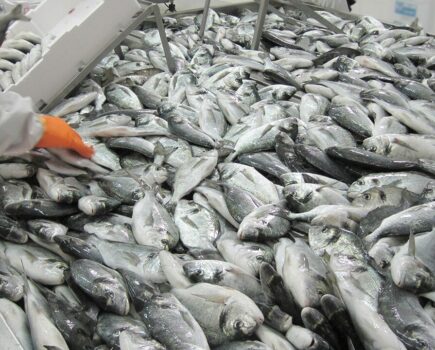‘Kick in the teeth’ after loss of access, says skipper
Seafood industry leaders outlined their frustrations this week at the launch by Asda of a promotion of imported fish from Norway, reports Andy Read.
Reacting to the launch, a partnership between Asda and the Norwegian Seafood Council, Jane Sandell, chief executive of UK Fisheries, operator of the Hull-based freezer trawler Kirkella (the bridge of which you can see in the image above, fishing through the ice in Svalbard) told Fishing News: “It’s a great pity that rather than support British fishermen, Asda are choosing to undermine the UK industry, and our own steps to ensure that prime, UK-caught sustainable cod and haddock are available to UK consumers.
“Due to a flawed interpretation of the TCA agreement that was part of the Brexit deal, and the UK failure to secure a deal with Norway, UK Fisheries Ltd alone has lost 9,000t of whitefish quota in Svalbard and Norwegian waters. That this same fish is now being imported to compete with UK-caught cod and haddock merely adds salt to the wound.”
The retail campaign, which will include direct mailshots to Asda customers, with targeted focusing on consumers in two cities, will concentrate on cod and haddock, imported by Asda for sale under its own label, and will stress the sustainable nature of Norwegian fisheries.
Hans Frode Kielland Asmyhr, the UK director at the Norwegian Seafood Council, said: “The consumer has spoken: our research revealed that sustainable fish is important to 87% of UK consumers.
“Norway leads the whitefish sector on sustainability and quality. We’ve not only been setting the highest standards in our fisheries for years, but we’ve been driving the agenda at a global level. With whitefish a classic dish on British menus, there’s still a long way to go to educate consumers.
“Fortunately, with the support of Asda and New England Seafood, we’ve developed clear packaging and powerful retail messaging – in-store and online alongside driving national awareness through social media.
“Equipping consumers with the right information means they can ‘vote with their feet’, making buying decisions that take into account the future of the planet. We’re looking forward to seeing how the campaign goes, with the aim of rolling it out across the UK in the next few years.”
Colin Stephen, skipper of the Peterhead trawler Harvest Hope PD 120, a regular visitor to Norway waters until access was prevented this year, challenged the claims made by Norway, saying: “The inshore haddock fishery in Norway had its MSC certification removed in April this year, whilst unilateral increases by Norway to their mackerel catches this year has put unwanted pressure on this stock, and prices received. It is rich for the Norwegian Seafood Council to make these claims about sustainability.
“We have supplied cod and haddock direct to supermarkets in recent years, and seen the price impacts caused by loss of Norway waters to the Scottish demersal fleet. The better run of larger haddock, which we used to take in Norwegian waters, are now not available to us, and we have seen the price increases for this larger size as a result on the markets.
“At the same time, the huge numbers of smaller haddock further west, for which there is a shortage of processing staff, means prices for small haddock are rock-bottom and not worth fishing.
“We are doing our best to adapt to the loss of access to Norwegian waters, and are fishing some new areas, trying to avoid the run of smaller fish. This has led us to increase landings of pollack, monk, ling and other mixed fish, but this move by Asda is a further kick in the teeth, marketing fish which would have been caught by the Scottish fleet if we had not lost access to Norway.”
Another industry source estimated the losses on haddock, due to the growing price differential, at ‘north of £400 a tonne, for every tonne taken in Scottish waters instead of Norway’, but did express some optimism that access to UK vessels, at least to Norwegian waters south of 62°N, would be restored in 2022, due to the Norwegian need to access mackerel in UK waters, as well as mixed demersal stocks.
This, however, will in the short term do nothing to mitigate the mismatch between supply and demand by UK supermarkets and processors for the run of larger fish to which UK vessels currently have restricted access.
A spokesperson for Asda told Fishing News that the campaign was ‘actually a commercial partnership with NSC [Norwegian Seafood Council] to promote some of their products in store and online, rather than a move by Asda to source more products from Norway’. They added: “We regularly run these types of campaigns for suppliers across many different categories.”
Reports elsewhere in the retail and seafood sector, however, suggest that this initial Asda campaign is the first of several that the Norwegian Seafood Council has in preparation.
This story was taken from the latest issue of Fishing News. For more up-to-date and in-depth reports on the UK and Irish commercial fishing sector, subscribe to Fishing News here or buy the latest single issue for just £3.30 here.








